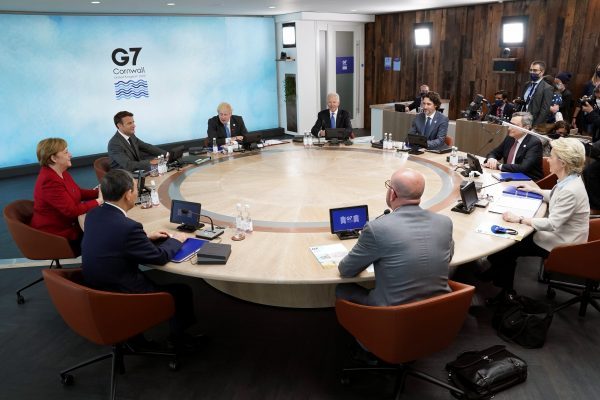The return of the G7

The G7 is back. A post-Brexit ‘Global Britain’ has ambitions for an international leadership role and has coordinated a call from the Group of Seven advanced economies for reform of global rules.
The United States has ceased playing spoiler in international meetings. Leadership and cooperation has been absent from the global community at a time when it’s been most needed during the COVID-19 pandemic. Its return is welcome, although matching the new rhetoric with substance will be a harder game.
There have been some lofty sounding announcements from the richest countries gathered in Cornwall but less substance to match. The commitment to donate one billion doses of COVID-19 vaccines to poorer countries falls short of what’s needed.
US President Joe Biden and UK Prime Minister Boris Johnson agreed on a new ‘Atlantic Charter’ that will simply open travel up across the Atlantic. With a straight face the British are calling the package of announcements the ‘Cornwall consensus’.
The G7 is no longer as important as it used to be. That’s why the G20 was elevated to a leaders’ meeting in 2008 during the global financial crisis. The G7 accounted for 46 per cent of the global economy in nominal values prior to COVID-19.
Including the non-member invitees Australia, India, South Africa and South Korea, that’s about half of global GDP. In purchasing power parity terms, the G7 is 32 per cent of the global economy and smaller than the remaining 13 G20 members.
The club of rich liberal democracies can no longer set global rules alone though it can aspire to lead an open, rules-based global economy. First, it has to practise what it preaches. The United States once again has adults in charge but its foreign policy for a middle class looks a more diplomatic version of America First.
Japan preaches a ‘Free and Open Indo-Pacific’, but it initiated a highly politicised economic spat with South Korea and, together with Australia, has become more restrictive towards foreign investment. ‘Global Britain’ is smaller as it retreats from Europe and may yet exclude the City of London from the new agreement on a global minimum corporate tax rate of 15 per cent.
The Cornwall meeting over the weekend shows promise for the provision of global public goods from the rich world but global leadership requires leading by example. The commitment to stronger action on climate change is a case in point. The G7’s call for reform of the WTO is welcome but it won’t be able to write the rules alone.
In our lead article this week, Shiro Armstrong points to the less remarked APEC trade ministers’ meeting a week earlier as an example of global cooperation on trade that may be at least as consequential. Importantly in APEC ‘the emphasis differs from the G7 approach and is inclusive of developing country interests’.
The global trade rules are outdated and cover a smaller proportion of global commerce each year. After the Uruguay Round transformed the GATT into the WTO, there has been no successful multilateral round of WTO negotiations, with the Doha Development Round as good as dead. Rules are needed for trade in services, investment and the digital economy, and disciplines are needed on subsidies to fisheries, agriculture and industry.
Many in the advanced industrialised economies blame China for the current trading system being unworkable. Chinese state-owned enterprises and the protections and subsidies they receive distort competition in China, and because China is so large, these distortions affect the global economy. Like other major WTO members, China has become better at navigating, even gaming, the system.
To lay the blame on China for an outdated system where others have also played spoiler misdiagnoses the problem. Reform in China will go a way towards helping but will not save the WTO from itself. The existing rules are not enforceable since the United States vetoed the appointment of new judges to the WTO dispute settlement system. India is notorious for exercising its veto in WTO negotiations on issues like trade facilitation.
China’s accession to the WTO in 2001 fundamentally changed the country and the global trading landscape. The price it had to pay at the time was that its commitments went beyond those of existing WTO members and others acceding to the trading body.
It’s not just China but modern global commerce that has outgrown the rules. Many of the issues under contention are in areas where rules do not exist. The lack of multilateral investment rules, for example, leaves open accusations of forced technology transfer, debt trap diplomacy and unfair competition.
The WTO needs broad support, if not consensus, to reform and rewrite its rules. The G7 needs China and the other half of the world to play ball to renovate the global trading system.
That’s where ‘one of those developing countries — Indonesia, not China — could be key to reform of global trade rules’ says Armstrong.
Indonesia will host the G20 in 2022 when there is still unlikely to be any certainty about global recovery from COVID-19. ‘As a democratic, dynamic developing country that is majority Muslim, Indonesia has moral authority in global governance that it can exercise.
It is roughly half of the strategically important and economically large ten-member Association of Southeast Asian Nations in economic size and population and chairs the Group of 33 developing countries in the WTO’.
East Asia’s Regional Comprehensive Economic Partnership (RCEP) agreement, concluded late last year, was conceived in Indonesia and it was Indonesia that led and navigated the ASEAN-centred agreement to conclusion. The reforms and market opening measures to which China committed in RCEP are significant.
‘Indonesia put an initiative forward for WTO reform during Osaka’s G20 summit in 2019 but it was overshadowed by China-US rivalry and the hosts trying to keep then US President Trump from blowing up the summit. It will have another chance next year’, Armstrong reminds us.
China and Indonesia can no longer use their developing country status as an excuse. They too must lead by example. Indonesia has avoided fully embracing international competition and refused to engage in digital economy rulemaking.
China must now match its rhetoric on openness with substance. Its size and growth have caused problems for which others have had to bear the costs of adjustment. Its political assertiveness has fed uncertainties and insecurities, damaging its reputation as a partner.
Two decades ago the G7 comprised 65 per cent of the global economy. Today the rest account for 55 per cent. Neither the G7 nor the rest can refashion the global trade regime alone. A G7 plus club that seeks to exclude the rest invites post-Trumpian global disintegration via another route and a shrinking world economy.
China’s future as a modern economy still gives it a vital stake in fixing what is broken in the system. And the G20 remains the best chance of securing global buy-in to new rules for a post-COVID-19 global order.
This article was published by the East Asia Forum.
Based out of the Crawford School of Public Policy within the College of Asia and the Pacific at the Australian National University, the Forum is a joint initiative of the East Asian Bureau of Economic Research (EABER) and the South Asian Bureau of Economic Research (SABER).













